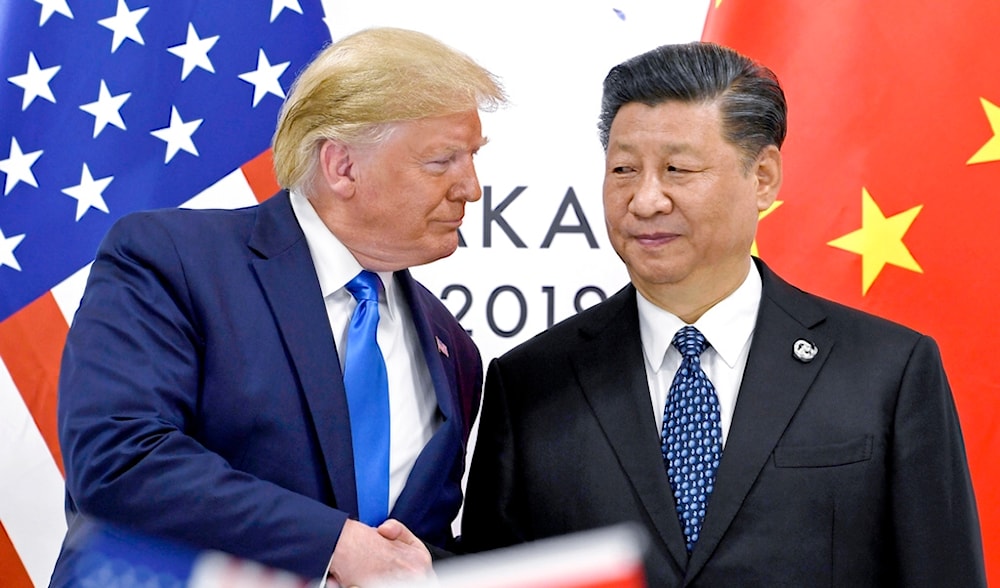US to impose fees on China-linked ships, urges allies to follow suit
The United States' executive order against Chinese-flagged or built ships threatens allies to take similar measures or face retaliation.
-

President Donald Trump shakes hands with China's President Xi Jinping during a meeting on the sidelines of the G-20 summit in Osaka, Japan, June 29, 2019. (AP)
The United States is preparing to impose docking fees at its ports on any ship belonging to a fleet that includes Chinese-built or Chinese-flagged vessels, while also threatening allies to adopt similar measures or face potential retaliation, Reuters reported on Thursday, citing a draft executive order.
US President Donald Trump's administration is crafting the order as part of efforts to revive domestic shipbuilding and curb China's so-called influence over the global shipping industry.
Addressing China's expanding maritime dominance and the decline in US naval readiness is one of the few issues where both Republican and Democratic lawmakers find common ground.
Chinese shipbuilders now account for over 50% of the global merchant vessel cargo capacity produced annually, a sharp rise from just 5% in 1999, according to the Center for Strategic and International Studies, overtaking shipbuilders in Japan and South Korea, while US shipbuilding, which peaked in the 1970s, now represents only a small fraction of global output.
The draft executive order, dated February 27 and reviewed by Reuters on Thursday, proposes levying fees on any vessel entering a US port if it is part of a fleet that includes Chinese-built or Chinese-flagged ships, regardless of the ship’s origin.
The document builds on a recent proposal by the US Trade Representative’s office to impose fees of up to $1.5 million on Chinese-built vessels docking at US ports.
However, the draft executive order does not specify a threshold, unlike the USTR proposal, which suggested applying fees when Chinese-built ships made up at least 25% of a fleet. It also does not define the exact fee amounts or how they would be calculated.
The measure could lead to significant financial burdens for major shipping companies, including China’s COSCO, Switzerland’s MSC, Denmark’s Maersk, and Taiwan’s Evergreen Marine, as well as operators transporting bulk food, fuel, and automobiles.
Earlier this week, MSC CEO Soren Toft indicated that the world’s largest container carrier might reduce its port calls in the US to minimize exposure to the new charges.
The draft order also directs US officials to press allies and partners to implement similar restrictions or risk facing retaliatory actions.
Additionally, it proposes tariffs on Chinese cargo-handling equipment, citing concerns over national security and economic stability.
“The national security and economic prosperity of the United States is further endangered by the People's Republic of China's unfair trade practices in the maritime, logistics, and shipbuilding sectors,” the document claimed.
China counters US tariffs
On Tuesday, China imposed 15% tariffs on US chicken, wheat, corn, and cotton in addition to a 10% tariff on soybeans, sorghum, pork, beef, seafood, fruits, vegetables, and dairy products, set to go into effect on March 10, according to a Chinese Foreign Ministry Statement.
"The US' unilateral tariff measures seriously violate World Trade Organization rules and undermine the basis for economic and trade cooperation between China and the US," China's Ministry of Commerce stated, emphasizing that "China will firmly safeguard its legitimate rights and interests."
On February 4, China imposed a 15% tariff on US coal and liquefied natural gas, in addition to a 10% tariff on crude oil, agricultural equipment, and certain cars, which went into effect on February 10, in response to Trump launching his first 10% tariff on Chinese imports.
As Washington and Beijing escalate the trade war between the two countries, Trump said that he is in no rush to hold talks with his Chinese counterpart Xi Jinping, as fears of a trade war between the two countries rise.
Trump justifies his tariffs on China by claiming that it is responsible for the fentanyl epidemic in the United States, something Beijing said is a US problem, emphasizing that China has done its part in combating fentanyl trafficking.

 4 Min Read
4 Min Read








